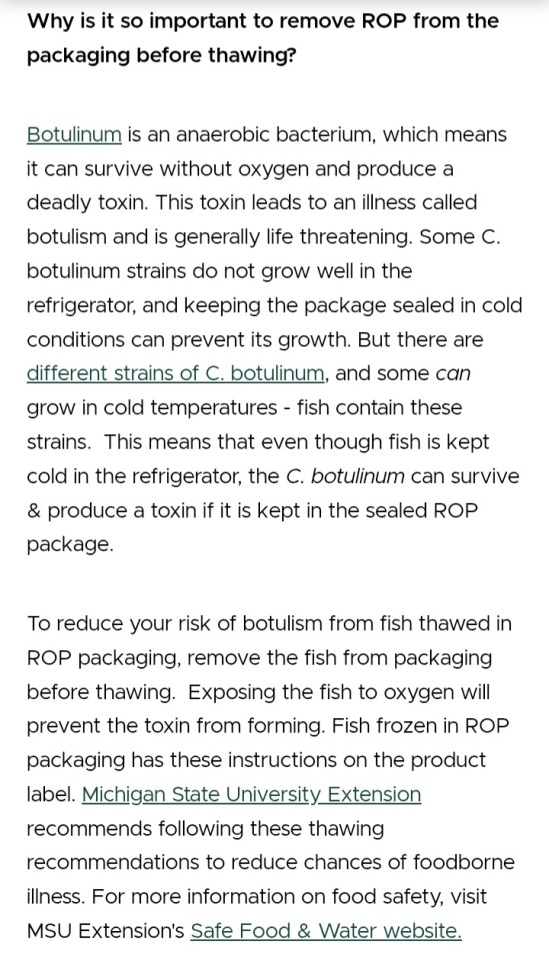#Food Science
Explore tagged Tumblr posts
Text

Pink Himalayan salt is often marketed as a premium product. While it contains trace minerals like calcium, iron, magnesium, and potassium, the amounts are so minimal that they have no significant impact on nutritional intake.
#Pink Himalayan Salt#Mineral Content#Nutrition#Health Claims#Salt Prices#Dietary Minerals#Gourmet Salt#Health Myths#Nutrition Facts#Food Science
209 notes
·
View notes
Text
Basic version: food or liquids are heated briefly (usually less than 3 minutes) in order to kill bacteria and extend the shelf life of the food.
Anon was specifically interested in any difference in results between the US and other parts of North America, as they've seen a lot of fearmongering around pasteurization in certain parts of the US-centric internet.
–
We ask your questions so you don’t have to! Submit your questions to have them posted anonymously as polls.
#polls#incognito polls#anonymous#tumblr polls#tumblr users#questions#polls about food#submitted june 22#food#pasteurization#science#food science#food safety
364 notes
·
View notes
Text
Ya know, sometimes a family is just a biologist, his brothers in Christ, and hundreds of pea plants.
#monkposting#monks#science history#food science#science#mad science#sciencecore#science side of tumblr#dark academic aesthetic#dark academia#dark cottagecore#cottagegore#cottagecore#cottage goth#history#biology#gregor mendel
302 notes
·
View notes
Text
Everyone's tongue is unique to them.
Everyone is going to have a different experience, tasting the same thing.
It's pretty well-known that some people have a gene to taste cilantro as 'soapy' or not. There are many other variants like that!
Some people are VERY sensitive to bitterness, and when they eat bitter flavors, they perceive that bitterness as far more overwhelming than someone who isn't sensitive. Children in particular are well-known to be bitter-sensitive. Dark chocolate, coffee, some types of vegetables, and other bitter compounds are revolting.
On the same token, there are people whose sense of bitterness is 'delicious!', so they REALLY enjoy things like mushrooms, matcha, beets, and other earthy flavors.
Some people are VERY sensitive to sweetness. Actually, your tongue can be adapted to sweetness, and perceive it less over time. Many people report no longer being able to stomach candy and sodas after cutting added sugar from their diet - your tongue literally changes how it perceives flavors, based on what you eat frequently.
Some people cannot taste major flavor compounds found in avocados, pomegranate, and blueberries. They'll say 'it tastes sour/sweet but otherwise like green water' - But other folks know all three fruit have very distinct flavors of their own.
Some people have trouble tasting the flavors in meat - My wife, for example, claims there's little to no taste difference between beef, chicken, and pork - that the only difference is in texture. Meanwhile I'm over here slurping beef juices off the plate.
And there's many other like this!
With that in mind - that our tongues are literally having entirely different experiences when touching the same foods... and also changing as we age, and based on what we eat...
There is no perfect food that will be universally good to everyone.
It doesn't matter how meticulous you are about cooking your steak, or folding your batter, or hand-picking only the freshest leaves on a dewy morning.
There will always be someone whose tongue is simply built different than yours, who thinks your favorite food is unpleasant to eat.
And that's okay!
Sometimes experiences can be unique and personal. A food doesn't have to be universally enjoyed to still be exquisite to those whose tongues can perceive it.
------
This is also a love letter to Durian, you sweet, foul-smelling fruit. Your innards taste like sweet, creamy vanilla-almond custard, but the gods have cursed you with a wretched hot-rotting-garbage stench to hide the divine dessert within.
You are beloved, beloathed, and banned from several forms of public transit. <3
#Durian#Food science#Maybe one day I'll meet the Durian who doesn't develop the odor until 3 days after its picked#and try the fruit without that smell#But until then#My poor nose must suffer for the delight of my tongue
316 notes
·
View notes
Text
71 notes
·
View notes
Text
Spending time in space has all sorts of effects on astronauts. Some perils of spaceflight are serious, others are best described as weird, and some fall in between, like the fact that food tastes bland and unappealing in space. This curious phenomenon can be a serious enough problem that some astronauts struggle to receive sufficient nutrition, leading a team of food scientists from Australia and the Netherlands to look into potential causes. Their recently published new study suggests that the explanation may lie in astronauts being isolated and uncomfortable, rather than being in orbit.
Continue Reading.
195 notes
·
View notes
Text
73 notes
·
View notes
Text
Bubblegum contains 100% of all vitamins an average adult needs in their diet.
48 notes
·
View notes
Text



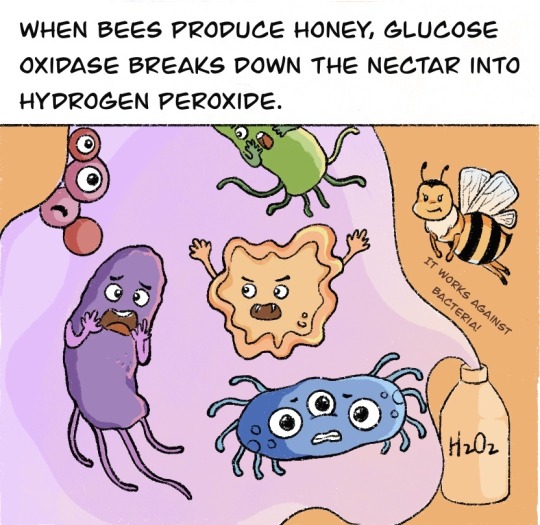
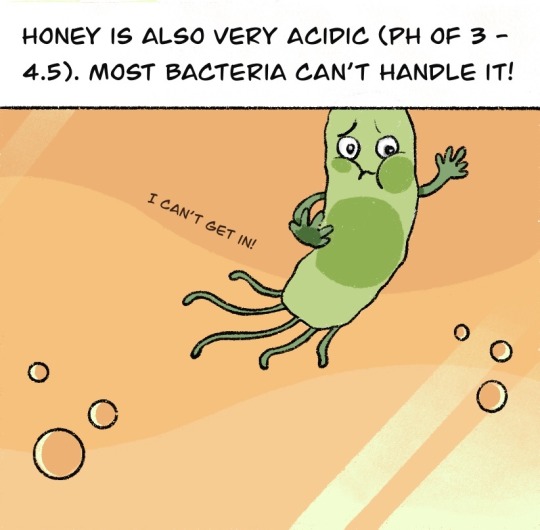
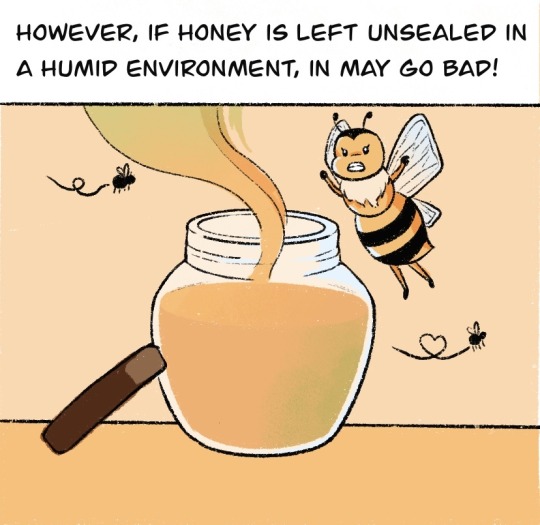
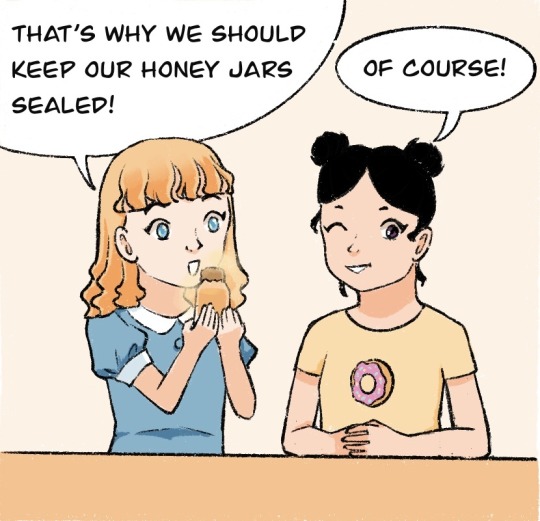
Do you know that a 3000-year-old honey was still edible? Does honey ever spoil?
#sciart#cute illustration#studyblr#sciencecommunication#biochemistry#stem education#chemistry#science#chemistry in real life#biology#food science#comics#cute comics
812 notes
·
View notes
Text
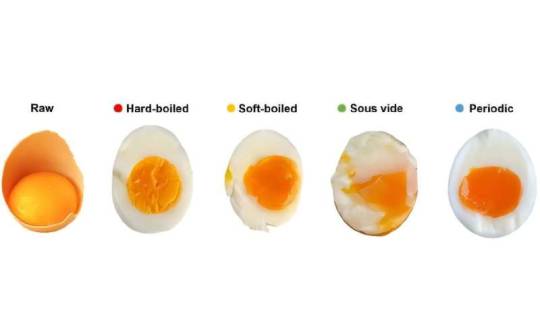
Periodic cooking: Cracking the method for the 'perfect' boiled egg
A new method pioneered to optimally cook both the yolk and white (or albumen) of a boiled chicken egg has been published in Communications Engineering. The approach, which the authors call periodic cooking, yields an evenly-cooked egg with a higher nutritional content than shell-on eggs cooked by conventional boiling or sous vide methods. The yolk and white in chicken eggs cook at two different temperatures: the albumen cooks at 85 degrees Celsius, while the yolk cooks at 65 degrees Celsius. Conventional methods for cooking eggs by hard-boiling at 100 degrees Celsius result in the yolk being fully set, while cooking them at temperatures between 60 and 70 degrees Celsius in a water bath for one hour (a method known as sous vide) leaves the white undercooked.
Read more.
27 notes
·
View notes
Text
I interviewed for my dream job at the USDA a few months ago. I was second choice. I held out hope for months. Finally found out the other guy accepted. Fine. It’s research I really believe in even if I don’t get to be the one to do it. The research proposal I put together for the application excited me. I hope they take some of my ideas into consideration, I’m not precious about them. I want science to thrive.
Now as far as I can tell on the research unit site there are no active employees. And even though I didn’t get the job it still makes me so mad. I guess it’s slightly better than getting the job and relocating and then getting laid off 3 months in but still the fact that myself and my unnamed competitor went through a really rigorous application process to run a research lab only for it to be for fucking nothing makes me so mad. I don’t know if they actually laid off all employees but they definitely laid off probationary employees (>3 years) and all the effort that goes into those probationary years, the funding secured to build a lab and a research project and hire post docs to get fucking nothing from it is such a goddamn waste. One of the probationary researchers I know was laid off was an analytical chemist and do you KNOW how expensive a GC-MS is??? The analytical chemist I worked with at UC Davis liked to say his lab was the equivalent value of a cul-de-sac of homes in Davis.
Plus agricultural research is by nature of agriculture SLOW. Shit takes time to grow. So much fucking WASTE by shuttering USDA-ARS sites. I know it wasn’t just Davis. I have a USDA-ARS job search alert that has gone dark.
When I interviewed and asked about the election they said they had some concerns about Trump but agriculture was so bi partisan that it was very unlikely that the election would have a major impact on the department.
Fuck Elon Musk, fuck DOGE, fuck Trump. I’ve been dealing with this shitty ass job market for over a year trying to leave my terrible startup and the potential for government work felt like a miracle. The people who achieved that should not go through being put out like that. Plus you know fast paced industry jobs won’t want employees used to the pace of government bureaucracy.
I just I know there’s so much bad going on but this one hits close to home.
Also the research project was mitigating the effect of wildfire smoke exposure on grapes and other west coast agricultural products so enjoy further enshittification of your west coast fruits and veggies because it’s certainly gonna not stop being on fire there.
Man I went on my yearly vacation to Washington wine country right after the interview over the summer and the small wineries I visited were so excited about the research the USDA was doing.
It’s so fucking stupid
#personal#elon musk#donald trump#trump administration#usda#usda-ars#food science#food scientist#academia#food research#wine research#rant#political rant#layoffs#government layoffs#fuck musk#fuck doge#fuck Trump#fuck everything#unemployed feels
22 notes
·
View notes
Text

Ohio State researchers created “e-Taste,” a device that can mimic taste sensations for virtual reality. Imagine biting digital cake and actually tasting it!
41 notes
·
View notes
Text
Between the possibility finding life on other planets, the first sighting of a colossal squid, the weird dire wolf situation, and everything science related losing its funding, this is one heck of a week for the science community.
#science#sciencecore#mad science#food science#dire wolf#dire wolves#mad scientist#colossal squid#us politics#k2 18b#aliens and ufos#alien species#astro academia#astronomy#astro observations#astro community#biology#zoology#marine life#marine biology
23 notes
·
View notes
Text
instagram
If anyone is following the Red 3 discourse in the wellness community this is a really good breakdown of the facts surrounding the decision to ban it.
Major takeaways:
Zero studies showed Red 3 was carcinogenic in humans
Very few food products actually use Red 3 (most of the lists I’ve seen have products that use Red 40, a different additive)
Comment: this hyper focus on food additives is not actually helpful for the health of the public. Food additives are rigorously studied by many major public health administrations world wide. If they cause negative heath effects, they will be discovered and banned. The push to remove all additives, including vitamins and preservatives, just serves to make food less accessible. Our time would be better spent addressing how much of the US lives in food deserts and how many people don’t have access to minimally processed foods at all. We could address the fact many people don’t have the ability to exercise and live under constant stress. Many people don’t have access to healthcare. Food additives are a scapegoat and just serve to distract from actual systemic issues that exist.
32 notes
·
View notes
Text
So i was thinking about the whole solarpunk chobani oatmilk ad (as depicted here) and a comment someone made in a different post (that I now can't find) where they said something along the lines of (paraphrasing) 'the marketing people at chobani being unable to imagine a future where their brand had ditched single-use containers in favor of a sustainable alternative'. And I started thinking how will food packaging look like in the solarpunk utopia?
Modern food packaging responds (mostly) to the needs of the globalized supply chain, where food products need to be moved great distances without being damaged and while taking up as little space and energy as possible. Packaging also needs to be made of the cheapest materials available, hence the preference for disposable containers made of light materials (cardboard, plastic, aluminium, paper, etc.). You don't want your package to be worth more than what it contains (although with some food products, that is close to being the case).
The comment I referenced earlier suggested using reusable glass containers as an example of a sustainable alternative to single-use containers. That makes sense, and there is historical (and current) precedent for such kinds of food containers. Just ask your parents (or grandparents, I guess) how milk used to be delivered to homes in the good ol' days.
In a more recent example, some places still use reusable (returnable) containers for products such as beer and (even!) Coca-cola, where you pay an initial fee for the container and get reimbursed once you return it, or you can exchange the empty container for a full one by paying the price of the product minus the container fee.
This solution, however, is still within the framework of the global supply chain of modern capitalism. In the solarpunk utopia, the goal would be to reduce (reuse, repair, recycle) the breadth of our current supply chain by prioritizing local consumption and disinsentivizing long-distance trade.
This train of thought led me to the question of wether processed, pre-packaged food would even be a thing in the solarpunk utopia. After all, if we are trying to consume only what is locally sourced, one of the main purposes of preserved (and thus packaged) food goes away. No need for bottled orange juice when you can just go to the commons bin and grab a kilo of fresh oranges to make your own.
Further, once there is no capitalism, the "convenience" angle of processed, packaged food also appears to go away. You don't have to work 9 hours a day, 6 days a week anymore. You have the time and resources necessary to make your own damn fresh orange juice, so why bother with the bottled stuff?
Well for one, not everything is as easy and convenient to do by yourself as orange juice. Fermented foods (cheese, wine, beer, soy sauce, even pickles and yogurt), bread and pastries and cakes, carbonated drinks, jams and marmalade, butter, mayonnaise, cured meats and fish, and (yes) almond milk are all tricky to make properly, take a long time to be made and/or are energy and resource intensive. The need for these kinds of foods will remain as long as we are human and find pleasure in eating and trying new things. Also, the need for mass-produced food does not go away with capitalism, after all we have a population of 10 billion humans with different dietary needs that need to be fed. Food safety standards must still be enforced and probably will be even more stringent when corporate profits are no longer standing in the way of progress.
To add to this, a localized supply chain will make food preservation even more important. After all, if you want your population to survive mostly on what can be produced in a 100 km radius, you will have to prepare for food scarcity. Droughts, floods, earthquakes, blizzards, accidents, and even just regular ol' winter (once we've rescued it from the clutches of climate change) don't care how solar your punk is. They will wreck your food supply and your utopia needs to be ready.
So the need for packaged food will remain. The need for food that can stay in a cupboard undisturbed for months (if not years) and remain edible (and reasonably palatable!) will continue to be there.
With all this in mind... what does food packaging look in our solarpunk utopia? Single-use plastics have gone the way of the dodo, as have single-use paper, cardboard, aluminium, glass, and steel. What has replaced them?
I have some ideas, but this post is already ridiculously long, so I'll save them for later. All I'll say for now is I think glass containers are not the way to go. Glass is heavy, fragile, a poor thermal conductor (so heating and cooling processes with glass containers are energy innefficient), and takes up a lot of space. It is also very resource and energy intensive to produce and recycle (so not the most environmentaly friendly in that regard either).
What does a reusable aluminium container look like? That'd be cool I think.
71 notes
·
View notes
